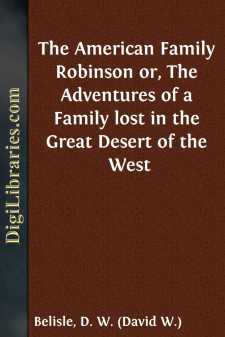Categories
- Antiques & Collectibles 13
- Architecture 36
- Art 48
- Bibles 22
- Biography & Autobiography 813
- Body, Mind & Spirit 142
- Business & Economics 28
- Children's Books 17
- Children's Fiction 14
- Computers 4
- Cooking 94
- Crafts & Hobbies 4
- Drama 346
- Education 46
- Family & Relationships 57
- Fiction 11829
- Games 19
- Gardening 17
- Health & Fitness 34
- History 1377
- House & Home 1
- Humor 147
- Juvenile Fiction 1873
- Juvenile Nonfiction 202
- Language Arts & Disciplines 88
- Law 16
- Literary Collections 686
- Literary Criticism 179
- Mathematics 13
- Medical 41
- Music 40
- Nature 179
- Non-Classifiable 1768
- Performing Arts 7
- Periodicals 1453
- Philosophy 64
- Photography 2
- Poetry 896
- Political Science 203
- Psychology 42
- Reference 154
- Religion 513
- Science 126
- Self-Help 84
- Social Science 81
- Sports & Recreation 34
- Study Aids 3
- Technology & Engineering 59
- Transportation 23
- Travel 463
- True Crime 29
The American Family Robinson or, The Adventures of a Family lost in the Great Desert of the West
Categories:
Description:
Excerpt
Chapter First.
Mr. Duncan's Discontentment. He starts for the West.
Near the Cold Springs, in Lafayette county, Missouri, lived Mr. Duncan, a sturdy woodsman, who emigrated thither with his father, while the Mississippi valley was still a wilderness, inhabited by wild beasts, or the still more savage Indians. His grandfather was an eastern man; but had bared his brawny arm on many a battle field, and had earned the right to as many broad acres as he chose to occupy. So, at least, he said, on leaving his eastern home, after peace had been declared, for the then verge of civilization—the Ohio. Here the soldier lived to see the wilderness blossom like the rose, and here he died, grieving that infirmity prevented his flying from the din of the sledge hammer, and the busy hum of mechanical life. Mr. Duncan's father, in the vigor of manhood, crossed the Mississippi, and settled at the Cold Springs, a region then isolated from civilization, as the Ohio was many years before the white man had planted his foot west of the Alleghanies. But he lived to see the silent echoes resound to the shrill whistle of the engine, and luxury with its still but mighty sway enervate the sons and daughters of the pioneers, until the one quailed at the sight of danger and the other dosed away the morning in kid slippers and curl-papers. Time claimed its own, and he died; and then his son, the Mr. Duncan of our narrative, began to turn his attention to the west, as his grandfather and his father had done before him. He had married a trapper's daughter, twenty years before, and his family consisted now of four sons and two daughters, an adopted son, and his brother-in-law, Andy Howe, who had spent his life in trapping, and trading with the Indians.
Lewis, his eldest son, nineteen years of age, was a man in strength, proportion and judgment, cool and prompt in emergencies, but on ordinary occasions caring for little else than his dogs, gun and uncle, whose superior knowledge of all that pertained to the forest, made him an oracle among the less experienced.
Edward, a boy of seventeen, passionate and headstrong, but generous and brave.
Jane, a girl of fifteen, the mother's supporter and helper, high spirited, energetic and courageous.
Martin, a pleasure-seeking, fun-loving, mischief-making lad of twelve years.
Anne, a timid child of ten years, who went by the soubriquet of the baby, by all except Lewis, who understood her better and called her the "fawn."
And last, but not least, the son of his adoption, Sidney Young, a noble young fellow of eighteen, whose parents dying left him to the care of Mr. Duncan, who had reared him with as tender care as that he bestowed upon his own children.
"Little Benny," or Benjamin more properly, we must not forget to introduce, a manly little fellow of eight, who could handle a bow and arrow, or hook and line, and propel a canoe with as much dexterity as a young Indian.
Such was the family of Mr. Duncan, when he resolved to penetrate the almost unknown region of the west....


